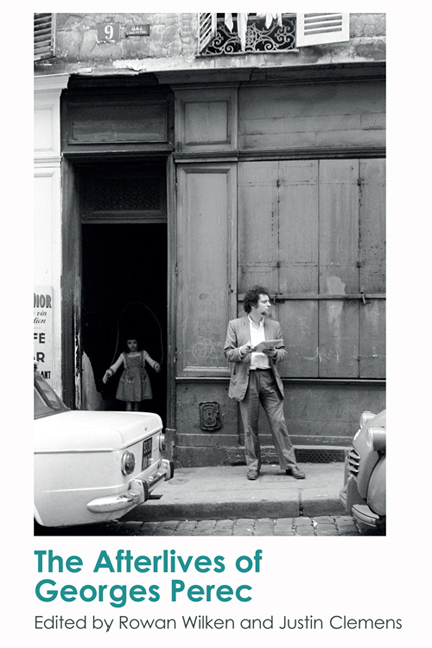Book contents
- Frontmatter
- Contents
- List of Figures
- Acknowledgements
- Notes on Contributors
- 1 Posthumous News: The Afterlives of Georges Perec
- PART I Art of the (Un)realisable
- PART II The Poetics of the Quotidian and Urban Space
- 6 Georges Perec and the Significance of the Insignificant
- 7 What Perec Was Looking For: Notes on Automation, the Everyday and Ethical Writing
- 8 ‘Things That Should Be Short’: Perec, Sei Shōnagon, Twitter and the Uses of Banality
- PART III Ludic Intensities and Creative Constraints
- PART IV Productive Problems of Description and Transcription
- Afterword
- Index
6 - Georges Perec and the Significance of the Insignificant
from PART II - The Poetics of the Quotidian and Urban Space
Published online by Cambridge University Press: 07 December 2017
- Frontmatter
- Contents
- List of Figures
- Acknowledgements
- Notes on Contributors
- 1 Posthumous News: The Afterlives of Georges Perec
- PART I Art of the (Un)realisable
- PART II The Poetics of the Quotidian and Urban Space
- 6 Georges Perec and the Significance of the Insignificant
- 7 What Perec Was Looking For: Notes on Automation, the Everyday and Ethical Writing
- 8 ‘Things That Should Be Short’: Perec, Sei Shōnagon, Twitter and the Uses of Banality
- PART III Ludic Intensities and Creative Constraints
- PART IV Productive Problems of Description and Transcription
- Afterword
- Index
Summary
Georges Perec died in 1982 at the age of forty-five. What is he for us now, thirty-three years later, in the second decade of the twenty-first century? How do we make him our contemporary? To make Perec's work part of our present-day involves (perhaps counter-intuitively) grasping his project in its historical specificity. It isn't by cherry-picking useable aspects of the work that we will ensure some relevance to its afterlife: rather, it will be by recognising his larger project as a response to a particular historical situation. While Perec's situation in the 1960s and 1970s in France is not ours, it has its hooks in our world. Perec, I think, becomes our contemporary in the act of seeing those hooks, of seeing how a continuity of feeling and mood percolates through historical ruptures, and how changes in mood and feeling activate historical continuities.
There is a simple claim driving this essay, namely that a central aspect of Perec's project was its attempt to register actuality. Which is to say that his project was a form of realism and, like many forms of realism, it was a quest and a question rather than an answer or solution. And, as a question, Perec's realism goes something like this: in a situation where there is no specific artistic style that has a privileged access to reality, where scholarly disciplines are all trying to grasp their slice of reality and claim it as the reality, and where the real is saturated by the unreality of the commodity spectacle, how can realism be achieved? Or, slightly differently, and now as a quest rather than a question: if the means of grasping reality (from literature to sociology, from religion to politics) are in doubt, and, if, because of this, there is a suspicion about what in the world should count as significant, then realism might mean revealing the significance of the insignificant.
Perec's work is full of lists of objects and activities, of itemised occurrences and repeated gestures. It is also a constant puzzling and worrying about what to include as part of these itineraries and what to ignore. A crucial worry is that what presents itself as significant (intention or motivation, say, or political and national events) bears the mark of a doxa – an unquestioned assumption of value that reproduces a social order.
- Type
- Chapter
- Information
- The Afterlives of Georges Perec , pp. 105 - 119Publisher: Edinburgh University PressPrint publication year: 2017



